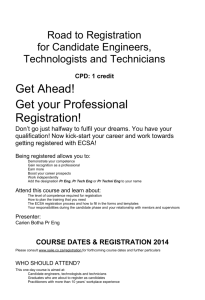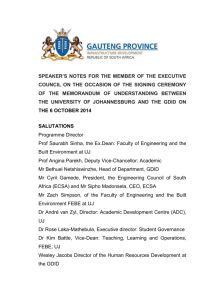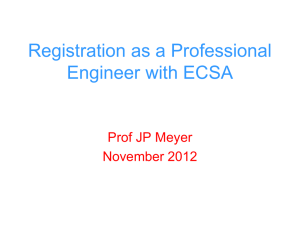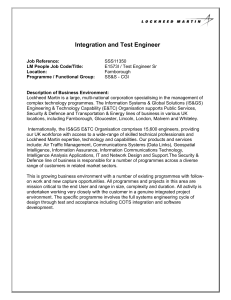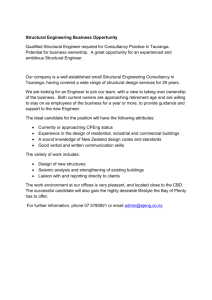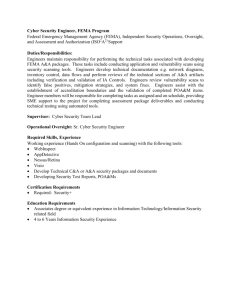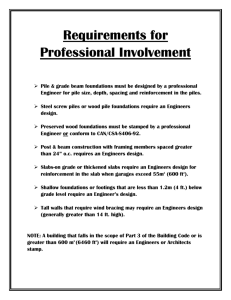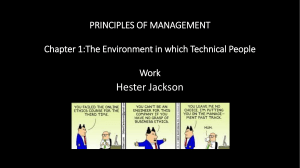Electrical / Electronic Engineering
advertisement
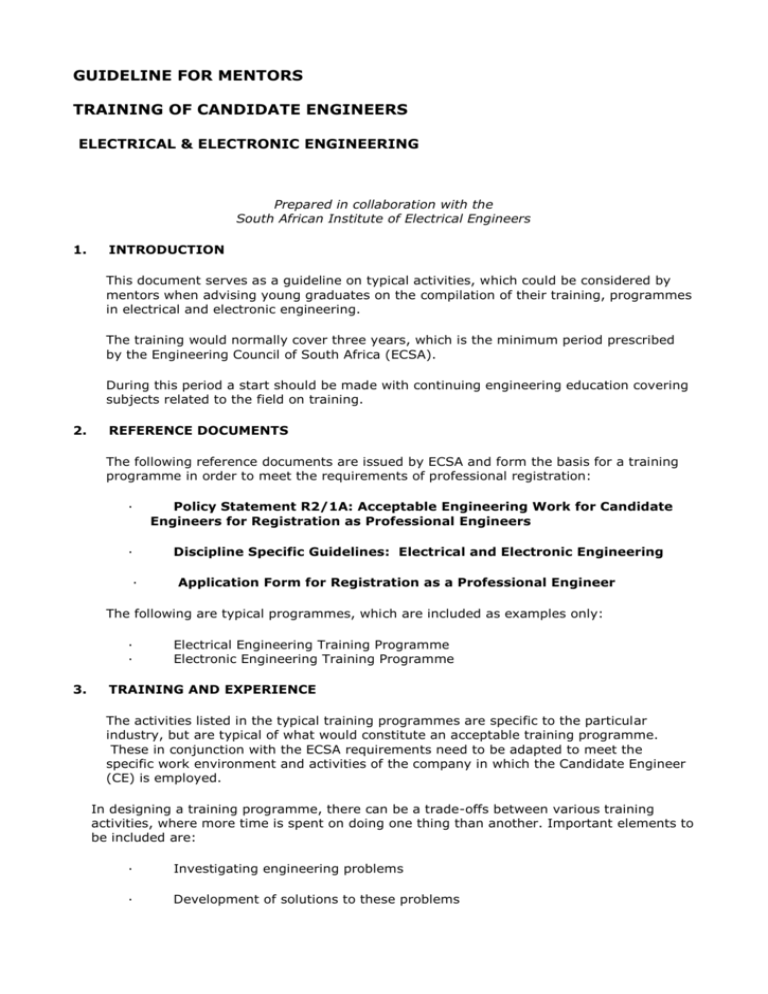
GUIDELINE FOR MENTORS TRAINING OF CANDIDATE ENGINEERS ELECTRICAL & ELECTRONIC ENGINEERING Prepared in collaboration with the South African Institute of Electrical Engineers 1. INTRODUCTION This document serves as a guideline on typical activities, which could be considered by mentors when advising young graduates on the compilation of their training, programmes in electrical and electronic engineering. The training would normally cover three years, which is the minimum period prescribed by the Engineering Council of South Africa (ECSA). During this period a start should be made with continuing engineering education covering subjects related to the field on training. 2. REFERENCE DOCUMENTS The following reference documents are issued by ECSA and form the basis for a training programme in order to meet the requirements of professional registration: · · · Policy Statement R2/1A: Acceptable Engineering Work for Candidate Engineers for Registration as Professional Engineers Discipline Specific Guidelines: Electrical and Electronic Engineering Application Form for Registration as a Professional Engineer The following are typical programmes, which are included as examples only: · · 3. Electrical Engineering Training Programme Electronic Engineering Training Programme TRAINING AND EXPERIENCE The activities listed in the typical training programmes are specific to the particular industry, but are typical of what would constitute an acceptable training programme. These in conjunction with the ECSA requirements need to be adapted to meet the specific work environment and activities of the company in which the Candidate Engineer (CE) is employed. In designing a training programme, there can be a trade-offs between various training activities, where more time is spent on doing one thing than another. Important elements to be included are: · Investigating engineering problems · Development of solutions to these problems · Taking increasing responsibility for engineering work. A training programme can typically be divided into three phases: 3.1 Exposure to the practical aspects of engineering This would typically cover a period of six to twelve months and would be focused on the application of knowledge gained at University and the practical aspect of how things are: · Manufactured · Constructed · Erected · Field installed · Tested · Commissioned · Operated · Maintained · Faults located · Problem investigated The focus should include gaining knowledge and understanding of plant equipment, the relevance of occupational health and safety, machinery and works regulations and any discipline specific safety regulations such as high voltage regulations. During this period the Candidate Engineer should attend relevant training courses on the above and such aspects as: 3.2 · Simulator training · Root cause analysis · Plant equipment Experience in design and the application of design knowledge This would typically cover a period of twelve to eighteen months and would focus on planning, design and applications, engineering covering such fields as: · · Analysis of data and systems Planning of networks and systems such as communications, control instrumentation, software, and electrical power. · System modelling and integration · Systems design · Network/circuit design · Component/Product application design · Software design · Research and investigations · Preparation of specifications and associated documentation · Development of standards · Application of quality systems · Configuration management These activities could apply in areas such as: · Mining · Manufacturing · Industrial · Commercial · Residential · Utility services (transport, communication, electricity supply) either to new products, equipment, systems, or plant or modifications to existing ones. During this period the CE should focus on training courses on such aspects as: 3.3 · Quality systems · Systems engineering · Structured methodologies applicable to software systems · Design techniques · Components, plant and equipment · Specification writing · Statistics Experience in the execution of engineering tasks or projects and the interaction between people, money and materials. This would cover the remaining training period in terms of ECSA's requirements, but would in reality be part of an ongoing career development in which an increasing level of responsibility would be taken for engineering work. The training could focus on projects and project management where time, cost and quality are of the essence as applied to the field of: · Design · Manufacture · Construction · Erection · Installation · Commissioning · Maintenance · Modifications During this period the CE should focus on training courses on such aspects as: 4. · Project Management · Conditions of contract · Value engineering · Negotiation Skills · Engineering finance · Risk analysis CONCLUSION In designing a training program, there can be trade-offs between various training activities, where more time is spent doing one thing than another. However, the need to take increasing responsibility for engineering work is the most important aspect.
